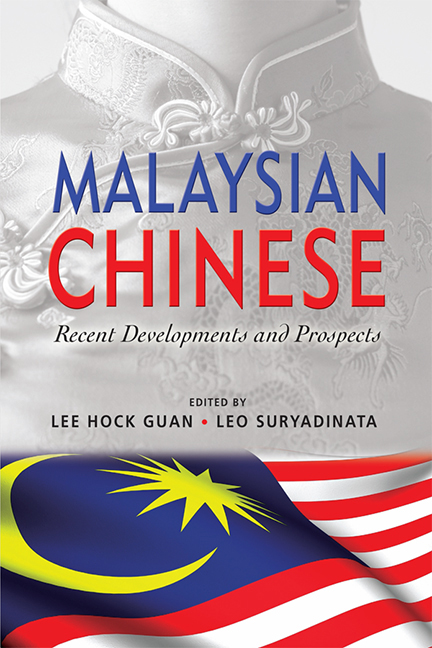Book contents
- Frontmatter
- Contents
- Preface
- Contributors
- Glossary
- Introduction
- 1 Malaysia: Ethnicity, Nationalism, and Nation Building
- 2 Being Muslim and Chinese in Malaysia
- 3 Quo Vadis: The Chinese in Malaysia
- 4 At a Crossroads: Malaysia's Coalition Politics and Chinese-based Political Parties
- 5 The End of Chinese Malaysians’ Political Division? The March 8 Political Tsunami and Chinese Politics in Penang, Selangor, and Perak
- 6 Forced to the Periphery: Recent Chinese Politics in East Malaysia
- 7 The New Malaysian Economic Agenda: Some Preliminary Observations
- 8 The Old And New Malaysian Chinese Language Press, with Special Reference to the 12th General Election
- 9 Education of the Chinese in Malaysia
- Index
1 - Malaysia: Ethnicity, Nationalism, and Nation Building
Published online by Cambridge University Press: 21 October 2015
- Frontmatter
- Contents
- Preface
- Contributors
- Glossary
- Introduction
- 1 Malaysia: Ethnicity, Nationalism, and Nation Building
- 2 Being Muslim and Chinese in Malaysia
- 3 Quo Vadis: The Chinese in Malaysia
- 4 At a Crossroads: Malaysia's Coalition Politics and Chinese-based Political Parties
- 5 The End of Chinese Malaysians’ Political Division? The March 8 Political Tsunami and Chinese Politics in Penang, Selangor, and Perak
- 6 Forced to the Periphery: Recent Chinese Politics in East Malaysia
- 7 The New Malaysian Economic Agenda: Some Preliminary Observations
- 8 The Old And New Malaysian Chinese Language Press, with Special Reference to the 12th General Election
- 9 Education of the Chinese in Malaysia
- Index
Summary
On 31 August 2007, Malaysia celebrated her fifty years of Independence from British rule. While Malaysians and non-Malaysians may hold differing views of Malaysia, both would, however, agree that there has been considerable economic achievement and visible modernity as symbolized by the famous Petronas Twin Towers and modern highways. But in recent years, there is a mounting general dissatisfaction among Malaysians over a number of developments, such as the increase in crime mainly in urban areas and scandals involving the police whose professionalism is questioned, as well as the perception of more corruption, and doubts about judicial independence. Above all, there is also agreement among researchers and observers, and even the general public, that Malaysia has become more racially divided. What has gone wrong?
This chapter will discuss ethnicity, nationalism, and nation building in Malaysia and see what we can learn from the Malaysian case. It will show that nation building in Malaysia has been shaped by the politics of ethnicity, which has fostered a communal world view and created a nation that is communally divided. In other words, not only Malaysians of different ethnic groups would imagine the Malaysian nation differently; but the nation itself has also become highly polarized. Because politicians of different ethnic groups have articulated along ethnic lines, the revival of Malay nationalism after 1969 and non-Malay reaction pushed the country to become a highly polarized nation. Malay nationalism here refers to the nationalistic ideology of the Malay elite who pursue a Malaysian nation that is Malay in cultural characteristics and Islamic in identity. It is communal nationalism or ethnic nationalism, that is, nationalism that is articulated by an ethnic group within a multi-ethnic state for the group's interest and to project the cultural nationalism aspired to by the group, or the cultural view of the nation as imagined by the group. This kind of nationalism is common in new states such as Malaysia and Indonesia, where the indigenous elite, faced with the presence of an influential minority such as the Chinese, seeks to have a greater share of the economy and to dominate the cultural conception of nationhood. But in practice, this nationalistic articulation serves to promote the economic and political interests of the indigenous elite. The communal nationalism we are concerned with here is, of course, not separatist nationalism, which seeks to form a separate state.
- Type
- Chapter
- Information
- Malaysian ChineseRecent Developments and Prospects, pp. 1 - 25Publisher: ISEAS–Yusof Ishak InstitutePrint publication year: 2011



